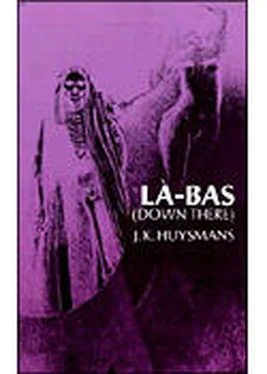Joris-Karl Huysmans - Down There (Là-Bas)
Здесь есть возможность читать онлайн «Joris-Karl Huysmans - Down There (Là-Bas)» весь текст электронной книги совершенно бесплатно (целиком полную версию без сокращений). В некоторых случаях можно слушать аудио, скачать через торрент в формате fb2 и присутствует краткое содержание. Жанр: Классическая проза, на английском языке. Описание произведения, (предисловие) а так же отзывы посетителей доступны на портале библиотеки ЛибКат.
- Название:Down There (Là-Bas)
- Автор:
- Жанр:
- Год:неизвестен
- ISBN:нет данных
- Рейтинг книги:3 / 5. Голосов: 1
-
Избранное:Добавить в избранное
- Отзывы:
-
Ваша оценка:
- 60
- 1
- 2
- 3
- 4
- 5
Down There (Là-Bas): краткое содержание, описание и аннотация
Предлагаем к чтению аннотацию, описание, краткое содержание или предисловие (зависит от того, что написал сам автор книги «Down There (Là-Bas)»). Если вы не нашли необходимую информацию о книге — напишите в комментариях, мы постараемся отыскать её.
Down There (Là-Bas) — читать онлайн бесплатно полную книгу (весь текст) целиком
Ниже представлен текст книги, разбитый по страницам. Система сохранения места последней прочитанной страницы, позволяет с удобством читать онлайн бесплатно книгу «Down There (Là-Bas)», без необходимости каждый раз заново искать на чём Вы остановились. Поставьте закладку, и сможете в любой момент перейти на страницу, на которой закончили чтение.
Интервал:
Закладка:
"It was interested, as you may believe. I made myself the subject of a course of toxicological research, and, studying my food as it went down, I identified the frightful ingredients masking the mixtures of tannin and powdered carbon with which the fish was embalmed; and I penetrated the disguise of the marinated meats, painted with sauces the colour of sewage; and I diagnosed the wine as being coloured with fuscin, perfumed with furfurol, and enforced with molasses and plaster.
"I have promised myself to return every month to register the slow but sure progress of these people toward the tomb."
"Oh!" cried Mme. Carhaix.
"And you will claim," said Durtal, "that you aren't Satanic?"
"See, Carhaix, he's at it already. He won't even give us time to get our breath, but must be dogging us about Satanism. It's true I promised him I'd try and get you to tell us something about it tonight. Yes," continued Des Hermies, in response to Carhaix's look of astonishment, "yesterday, Durtal, who is engaged, as you know, in writing a history of Gilles de Rais, declared that he possessed all the information there was about Diabolism in the Middle Ages. I asked him if he had any material on the Satanism of the present day. He asked me what I was talking about, and wouldn't believe that these practices are being carried on right now."
"But they are," replied Carhaix, becoming grave. "It is only too true."
"Before we go any further, there is one question I'd like to put to Des Hermies," said Durtal. "Can you, honestly, without joking, without letting that saturnine smile play around the corner of your mouth, tell me, in perfectly good faith, whether you do or do not believe in Catholicism?"
"He!" exclaimed the bell-ringer. "Why, he's worse than an unbeliever, he's a heresiarch."
"The fast is, if I were certain of anything, I would be inclined toward Manicheism," said Des Hermies. "It's one of the oldest and it is the simplest of religions, and it best explains the abominable mess everything is in at the present time.
"The Principle of Good and the Principle of Evil, the God of Light and the God of Darkness, two rivals, are fighting for our souls. That's at least clear. Right now it is evident that the Evil God has the upper hand and is reigning over the world as master. Now-and on this point, Carhaix, who is distressed by these theories, can't reprehend me-I am for the under dog. That's a generous and perfectly proper idea."
"But Manicheism is impossible!" cried the bell-ringer. "Two infinities cannot exist together."
"But nothing can exist if you get to reasoning. The moment you argue the Catholic dogma everything goes to pieces. The proof that two infinities can coexist is that this idea passes beyond reason and enters the category of those things referred to in Ecclesiasticus: 'Inquire not into things higher than thou, for many things have shown themselves to be above the sense of men.'
"Manicheism, you see, must have had some good in it, because it was bathed in blood. At the end of the twelfth century thousands of Albigenses were roasted for practising this doctrine. Of course, I can't say that the Manicheans didn't abuse their cult, mostly made up of devil worship, because we know very well they did.
"On this point I am not with them," he went on slowly, after a silence. He was waiting till Mme. Carhaix, who had got up to remove the plates, should go out of the room to fetch the beef.
"While we are alone," he said, seeing her disappear through the stairway door, "I can tell you what they did. An excellent man named Psellus has revealed to us, in a book entitled De operatione Dæmonum , the fact that they tasted of the two excrements at the beginning of their ceremonial, and that they mixed human semen with the host."
"Horrible!" exclaimed Carhaix.
"Oh, as they took both kinds of communion, they did better than that," returned Des Hermies. "They cut children's throats and mixed the blood with ashes, and this paste, dissolved in liquid, constituted the Eucharistic wine."
"You bring us right back to Satanism," said Durtal.
"Why, yes, as you see, I haven't strayed off your subject."
"I am sure Monsieur Des Hermies has been saying something awful," murmured Mme. Carhaix as she came in, bearing a platter on which was a piece of beef smothered in vegetables.
"Oh, Madame," protested Des Hermies.
They burst out laughing and Carhaix cut up the meat, while his wife poured the cider and Durtal uncorked the bottle of anchovies.
"I am afraid it's cooked too much," said the woman, who was a great deal more interested in the beef than in other-world adventures, and she added the famous maxim of housekeepers, "When the broth is good the beef won't cut."
The men protested that it wasn't stringy a bit, it was cooked just right.
"Have an anchovy and a little butter with your meat, Monsieur Durtal."
"Wife, let's have some of the red cabbage that you preserved," said Carhaix, whose pale face was lighted up while his great canine eyes were becoming suspiciously moist. Visibly he was jubilant. He was at table with friends, in his tower, safe from the cold. "But, empty your glasses. You are not drinking," he said, holding up the cider pot.
"Let's see, Des Hermies, you were claiming yesterday that Satanism has pursued an uninterrupted course since the Middle Ages," said Durtal, wishing to get back to the subject which haunted him.
"Yes, and the documents are irrefutable. I'll put you into a position to prove them whenever you wish.
"At the end of the fifteenth century, that is to say at the time of Gilles de Rais-to go no further back-Satanism had assumed the proportions that you know. In the sixteenth it was worse yet. No need to remind you, I think, of the demoniac pactions of Catherine de Medici and of the Valois, of the trial of the monk Jean de Vaulx, of the investigations of the Sprengers and the Lancres and those learned inquisitors who had thousands of necromancers and sorcerers roasted alive. All that is known, too well known. One case is not too well known for me to cite here: that of the priest Benedictus who cohabited with the she-devil Armellina and consecrated the hosts holding them upside down. Here are the diabolical threads which bind that century to this. In the seventeenth century, in which the sorcery trials continue, and in which the 'possessed' of Loudun appear, the black religion nourishes, but already it has been driven under cover.
"I will cite you an example, one among many, if you like.
"A certain abbé Guibourg made a specialty of these abominations. On a table serving as tabernacle a woman lay down, naked or with her skirts lifted up over her head, and with her arms outstretched. She held the altar lights during the whole office.
"Guibourg thus celebrated masses on the abdomen of Mme. de Montespan, of Mme. d'Argenson, of Mme. de Saint-Pont. As a matter of fact these masses were very frequent under the Grand Monarch. Numbers of women went to them as in our times women flock to have their fortunes told with cards.
"The ritual of these ceremonies was sufficiently atrocious. Generally a child was kidnapped and burnt in a furnace out in the country somewhere, the ashes were saved and mixed with the blood of another child whose throat had been cut, and of this mixture a paste was made resembling that of the Manicheans of which I was speaking. Abbé Guibourg officiated, consecrated the host, cut it into little pieces and mixed it with this mixture of blood and ashes. That was the material of the Sacrament."
"What a horrible priest!" cried Mme. Carhaix, indignant.
"Yes, he celebrated another kind of mass, too, that abbé did. It was called-hang it-it's unpleasant to say-"
"Say it, Monsieur des Hermies. When people have as great a hatred for that sort of thing as we here, they need not blink any fact. It isn't that kind of thing which is going to take me away from my prayers."
Читать дальшеИнтервал:
Закладка:
Похожие книги на «Down There (Là-Bas)»
Представляем Вашему вниманию похожие книги на «Down There (Là-Bas)» списком для выбора. Мы отобрали схожую по названию и смыслу литературу в надежде предоставить читателям больше вариантов отыскать новые, интересные, ещё непрочитанные произведения.
Обсуждение, отзывы о книге «Down There (Là-Bas)» и просто собственные мнения читателей. Оставьте ваши комментарии, напишите, что Вы думаете о произведении, его смысле или главных героях. Укажите что конкретно понравилось, а что нет, и почему Вы так считаете.












